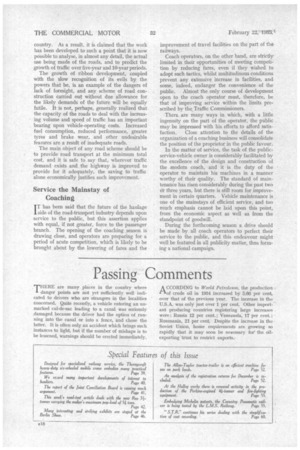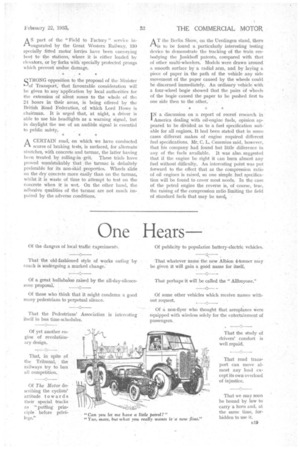Passing Comments
Page 36

Page 37

If you've noticed an error in this article please click here to report it so we can fix it.
_THERE are many places in the country where I danger points are not yet sufficiently well indicated to drivers who are strangers in the localities concerned. Quite recently, a vehicle entering an unmarked cul-de-sac leading to a canal was seriously damaged because the driver had the option of running into the canal or into a fence, and chose the latter. It is often only an accident which brings such instances to light, but if the number of mishaps is to be lessened, warnings should be erected immediately. ACCORDING to World Petroleum, the production . of crude oil in 1934 increased by 5.66 per cent over that of the previous year. The increase in the U.S.A. was only just over 1 per cent. Other import-. ant producing countries registering large increases were: Russia 12 per cent.; Venezuela, 17 per cent.; Roumania, 21 per cent. Despite the increase in the Soviet Union, home requirements are growing so rapidly that it may soon be nezessary foe the oilexporting trust to restrict exports., A'part of the "Field to Factory " service inaugurated by the Great Western Railway, 130 specially fitted motor lorries have been conveying beet to the stations, where it is either loaded by elevators, or by -forks with specially protected prongs which prevent undue. damage.
STRONG opposition to the proposal of the Minister of Transport, that favourable consideration will be given to. any application by local authorities for the extension of silent zones to the whole of the 24 hours in their areas, is being offered by the British Road Federation, of which Lord Howe is chairman. It is urged that, at night, a driver is able to use his headlights as a warning signal, but in daylight the use of an audible signal is essential to public safety.
A CERTAIN road, on which we have conducted -F-1 scores of braking tests, is surfaced, for alternate stretches, with concrete and tarmac, the latter having been treated by rolling-in grit. These trials have proved unmistakably that the 'tarmac is definitely preferable for its non-slid properties. Wheels slide on the dry concrete more easily than on the tarmac, whilst it is waste of time to attempt to test on the concrete When it is wet. On the other hand, the adhesive qualifies of the tarmac are not much impaired by the adverse conditions. AT the Berlin Show, on the Lierdingen stand, there is to be found a particularly interesting testing device to demonstrate the tracking of the train embodying the Jonkhoff patents, compared with that of other multi-wheelers: Models were drawn around a smooth surface by a radial ,arm, and by .laying a piece of paper in the path of the vehicle any side movement of the paper caused by the wheels could be discerned immediately. An ordinary vehicle with a four-wheel bogie showed that the pairs Of wheels of the bogie caused the paper to be pushed first to one side then to the other.
IN a discussion on a report of recent research in America dealing with oil-engine fuels, opinion appeared to be divided as to a fuel specification suitable for all engines. It had been stated that in some cases different makes of engine required different fuel specifications. Mr. C. L. Cummins said, however, that his company had found but little difference in any of the fuels available. It was also. suggested that if the engine be right it can burn almost any fuel without difficulty. An interesting point was put forward to the effect that as the compression ratio of oil engines is raised, so one simple fuel specification will be found to cover most needs. In the case of the petrol engine the reverse Ls, of course, true, the raising of the compression ratio limiting the field of standard fuels that may be used,.




































































































